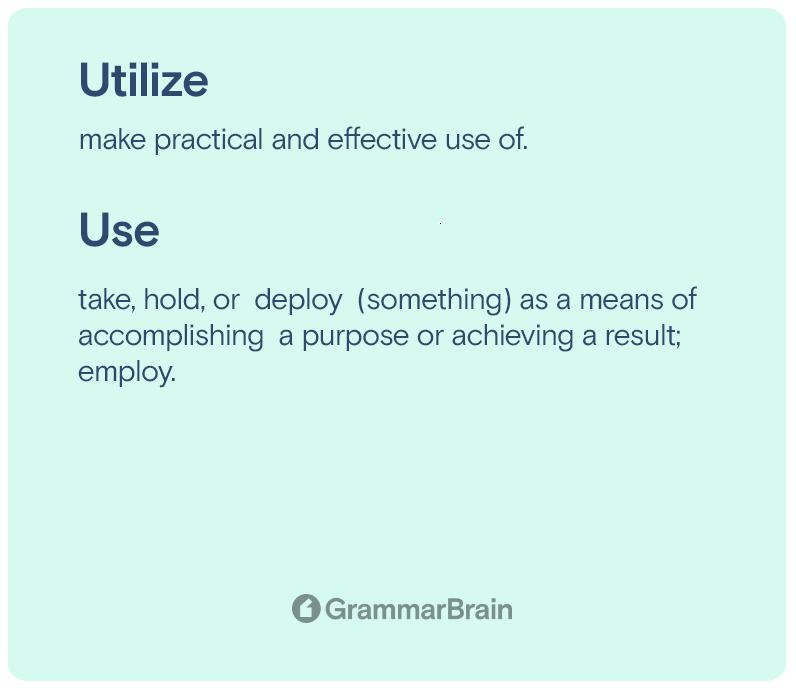What’s the difference between use and utilize? To use something is to utilize it, right? These two words can be very confusing in the English language. Learn the differences in this short American English guide.
Difference between use and utilize
A common confusion people face is deciding whether ‘use’ is the right word or ‘utilize’. In fact, most people use these two words interchangeably. Utilize is a popular word used in the corporate world. People love to use this word in reports and papers. The problem is that in most cases, it is not the appropriate word.
Utilize means converting something to use. The definition itself shows it is not the same as use. When something is used for a purpose other than its intended purpose, then utilize is the right word for the occasion. If you are using chewing gum to stick things together, then it is an alternate application. So, here the word utilize in applicable.
| Word | Definition |
| Use | take, hold, or deploy (something) as a means of accomplishing a purpose or achieving a result; employ. |
| Utilize | make practical and effective use of. |
Use: Definition and meaning
Use is a verb that has been in use from the 14th century. Let’s look at how use is defined in the dictionary.
Use is to take, deploy, or hold (something) to achieve something. An alternate word for use is employ.
As a word, the meaning of use is straightforward. It is employing something for a purpose. For instance, ‘I use my pen to write my notes.’ This is clear cut and explains the purpose of the pen.
Use can also be used as a noun. Eg: The laptop is meant for use by visitors.
Utilize: Definition and meaning
While use has been prevalent for a long time, utilize is a fairly new word. The word started to be used in the 19th century. It would be easier to understand this word by looking at its source. The French word utiliser is the source of this word and this word means ‘making effective use of something’.
The definition of utilize is ‘to make useful, to convert to use, to render useful’.
When something is meant for a particular purpose, but is converted for some other purpose then utilize is the right word to use.
You can utilize the pen to scratch your back. The purpose of a pen is to write. But here, the pointed nib of the pen is used (assumedly without ink) to scratch one’s back. Since the pen has been converted to some other use, the word ‘utilize’ is appropriate here.
Examples in sentences
- Use your skills to create a quality product.
- You can utilize the water bottle as a flower vase.
- Use the ribbon to tie the gift box.
- You can utilize the ribbon as a book mark.
Use or Utilize: Which is the right choice?
When you are using something for a purpose not intended originally, then you can use the word ‘utilize’. When something is used for the purpose for which it is meant, then the word ‘use’ is the right choice.
‘Are you going to use the vessel to cook?’ In this sentence, the purpose of a vessel is a utensil meant for cooking. So, ‘use’ is the right word here.
‘Will you utilize the vessel as a drum?’ In this sentence, the vessel is being used for something not intended. It is being used as a drum or a musical instrument. Since it is being converted for a different purpose, ‘utilize’ is the right choice.
You must note ‘Will you utilize the vessel to make soup?’ is incorrect. The vessel’s purpose is to cook. There is no ‘converting to use’ here. So, ‘utilize’ is the wrong choice.

Inside this article
Fact checked:
Content is rigorously reviewed by a team of qualified and experienced fact checkers. Fact checkers review articles for factual accuracy, relevance, and timeliness. Learn more.
Core lessons
Glossary
- Abstract Noun
- Accusative Case
- Anecdote
- Antonym
- Active Sentence
- Adverb
- Adjective
- Allegory
- Alliteration
- Adjective Clause
- Adjective Phrase
- Ampersand
- Anastrophe
- Adverbial Clause
- Appositive Phrase
- Clause
- Compound Adjective
- Complex Sentence
- Compound Words
- Compound Predicate
- Common Noun
- Comparative Adjective
- Comparative and Superlative
- Compound Noun
- Compound Subject
- Compound Sentence
- Copular Verb
- Collective Noun
- Colloquialism
- Conciseness
- Consonance
- Conditional
- Concrete Noun
- Conjunction
- Conjugation
- Conditional Sentence
- Comma Splice
- Correlative Conjunction
- Coordinating Conjunction
- Coordinate Adjective
- Cumulative Adjective
- Dative Case
- Determiner
- Declarative Sentence
- Declarative Statement
- Direct Object Pronoun
- Direct Object
- Diction
- Diphthong
- Dangling Modifier
- Demonstrative Pronoun
- Demonstrative Adjective
- Direct Characterization
- Definite Article
- Doublespeak
- False Dilemma Fallacy
- Future Perfect Progressive
- Future Simple
- Future Perfect Continuous
- Future Perfect
- First Conditional
- Irregular Adjective
- Irregular Verb
- Imperative Sentence
- Indefinite Article
- Intransitive Verb
- Introductory Phrase
- Indefinite Pronoun
- Indirect Characterization
- Interrogative Sentence
- Intensive Pronoun
- Inanimate Object
- Indefinite Tense
- Infinitive Phrase
- Interjection
- Intensifier
- Infinitive
- Indicative Mood
- Participle
- Parallelism
- Prepositional Phrase
- Past Simple Tense
- Past Continuous Tense
- Past Perfect Tense
- Past Progressive Tense
- Present Simple Tense
- Present Perfect Tense
- Personal Pronoun
- Personification
- Persuasive Writing
- Parallel Structure
- Phrasal Verb
- Predicate Adjective
- Predicate Nominative
- Phonetic Language
- Plural Noun
- Punctuation
- Punctuation Marks
- Preposition
- Preposition of Place
- Parts of Speech
- Possessive Adjective
- Possessive Determiner
- Possessive Case
- Possessive Noun
- Proper Adjective
- Proper Noun
- Present Participle
- Prefix
- Predicate



